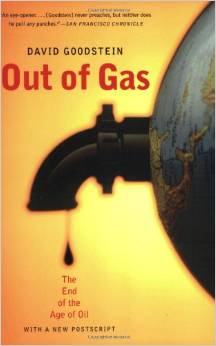Industry
A look into when we will run out of oil, and what an oil diprives world will look like. By: David L. Goodstein
Big Idea
Goodstein's thesis is that once we hit peak oil, the world will fall into disarray. He takes a fairly morbid point of view, as he does not believe thta humans will have the ability to change. He suggests that we all use less oil to expend the time it takes to hit the peak. Goodstien writes that if we ran out of oil too fast we might have to revert to coal, and then talks about how that would be devistating to the world, "the greenhouse effect that results eventually tips Earth's climate into a new state hostile to life." He then purposes a best case senero were everything is run off of methane until we can bridge the gap into solar production. Either way, Goodstien decleared, "this is the century in which we must learn to live without fossil fuels." The author backs up these claims using reaserch papers in fields ranging from thermodynamics to electromagnetism to geology. The book is told from third point of view, giving the author an omniscient voice in the book. He covers all aspects of society to the best of his ability. This point of view, however, leaves out the fact that humans are very resiliant, and when we need to, we can get things done incredibly fast. The book is told from the opinion of a schoolar, so it leaves out some non-logicle points of view. The author is considered to be one of the formost authorities on the world running out of oil.
I agree in part with Goodstein's theory, but not wholly. Humans need to change, there is no doubt about it. If we do not lessen our dependency on fossil fuels and begin using renewable resources, our society will not survive the peak. However, I don't agree with the authors stance that there is little to nothing we can do to change. I believe that, when pressed, humans will come together to begin the change, and our society will be stronger for it.
Cool Stuff
Oil Usage Graphic: http://www.theguardian.com/news/datablog/2010/jun/09/bp-energy-statistics-consumption-reserves-energy
David Goodstein Speach: http://www.youtube.com/watch?v=3vLZr09kD34
Info Graphic: http://www.coolinfographics.com/blog/2011/10/19/us-oil-consumption-infographic.html
Reviews: http://www.amazon.com/Out-Gas-The-End-Age/dp/product-description/0393326470/ref=dp_proddesc_0?ie=UTF8&n=283155&s=books
Bibilography
"Out of Gas: The End of the Age of Oil." Wikipedia. Wikimedia Foundation, 14 May 2014. Web. 15 May 2014.
"History of Petroleum." Wikipedia. Wikimedia Foundation, 05 Nov. 2014. Web. 14 May 2014.
"David Goodstein." Wikipedia. Wikimedia Foundation, 05 Nov. 2014. Web. 15 May 2014.
Goodstein, David L. Out of Gas: The End of the Age of Oil. New York: W.W. Norton, 2004. Print.
"Bootstrap." Bootstrap. N.p., n.d. Web. 15 May 2014. [Framework for the website]
"Professor David Goodstein Talks about "Out of Gas: The End of the Age of Oil"" YouTube. YouTube, 26 Apr. 2011. Web. 15 May 2014.
